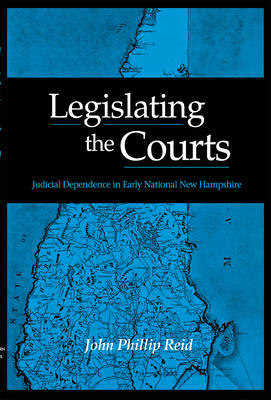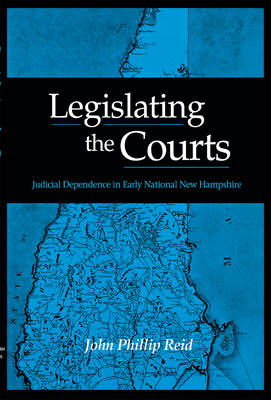
- Afhalen na 1 uur in een winkel met voorraad
- Gratis thuislevering in België vanaf € 30
- Ruim aanbod met 7 miljoen producten
- Afhalen na 1 uur in een winkel met voorraad
- Gratis thuislevering in België vanaf € 30
- Ruim aanbod met 7 miljoen producten
Legislating the Courts
Judicial Dependence in Early National New Hampshire
John Phillip ReidOmschrijving
In the first decades of the nineteeth century, legal reformers in the United States strove to standardize courtroom procedures and expand judges' power at the expense of jurors while simultaneously imposing uniformity upon judicial decision making. Reid's previous book, Controlling the Law, offered a case study of this process, focusing on New Hampshire Chief Justice Jeremiah Smith and Governor William Plumer. Now in Legislating the Courts, Reid returns to the careers of Smith and Plumer to continue the story of judicial authority in the early republic.
American constitutional historians and lawyers generally assume that the current doctrine of judicial supremacy not only has always been the rule of constitutional law but was the original intent of the framers of both the federal and state constitutions. This study disproves the validity of that assumption for state constitutionalism by concentrating on the law of New Hampshire--representative of the law in other jurisdictions--between the years 1789 and 1818. Legislating the Courts does not argue that judicial independence was not the desired rule among the framers of the constitutions; instead, by looking at both practice and constitutional theory, this study shows that the reality for the early republic was both judicial dependence and legislative supremacy.
To illustrate his points, Reid refers to three government practices that together with other matters altered judicial salaries--mandated by the constitution to be "permanent" and "honorable"--and that created a dependent judicial system. The first practice, "restoring litigants to their law," gave litigants who had lost a jury trial and had judgments pronounced against them the option to petition the legislature to be relieved from the judgment and to be granted a new jury trial. In the second practice the legislature acted on the premise that it had the authority to investigate the conduct of judges and require them to explain why they behaved in certain ways. Finally, in the third practice, the legislature exercised the authority to remove judges from their tenure at "good behavior" by "legislating" them out of office and then appointing a new bench.
Despite an attempt to subordinate the judiciary to the will of the citizenry, as represented by the state legislature, Reid finds that judges managed to maintain their autonomy, subject only to the dictates of the law.
Specificaties
Betrokkenen
- Auteur(s):
- Uitgeverij:
Inhoud
- Aantal bladzijden:
- 232
- Taal:
- Engels
Eigenschappen
- Productcode (EAN):
- 9780875803876
- Verschijningsdatum:
- 8/09/2008
- Uitvoering:
- Hardcover
- Formaat:
- Genaaid
- Afmetingen:
- 160 mm x 234 mm
- Gewicht:
- 498 g

Alleen bij Standaard Boekhandel
Beoordelingen
We publiceren alleen reviews die voldoen aan de voorwaarden voor reviews. Bekijk onze voorwaarden voor reviews.









